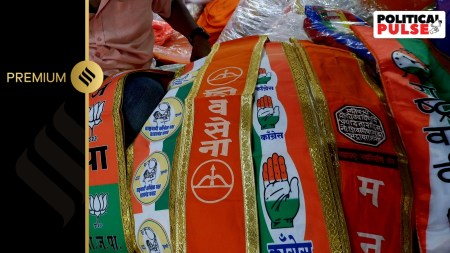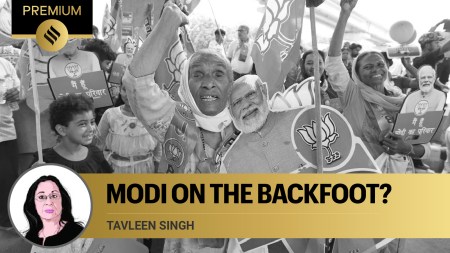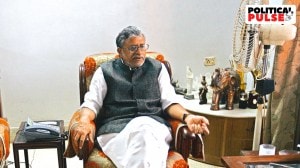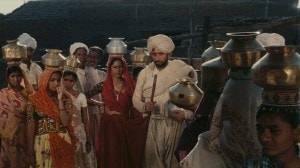- India
- International
Tipu Sultan’s contested legacy: Why the Karnataka BJP president wants to chase away ‘Tipu supporters’
What did Tipu Sultan do that today’s politicians just cannot leave him alone? We discuss Tipu Sultan and his legacy which has been a source of constant controversy.
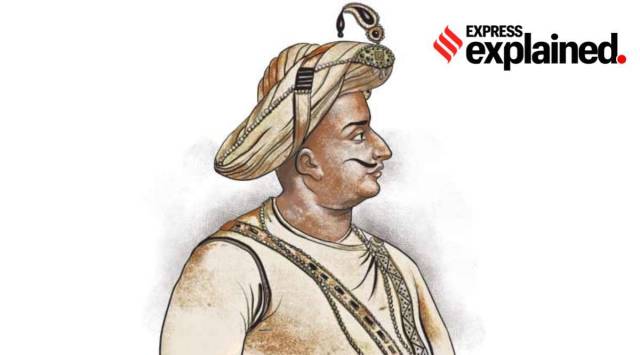 Tipu Sultan is one of the most contested historical figures of our time. (Express Illustration)
Tipu Sultan is one of the most contested historical figures of our time. (Express Illustration) Karnataka BJP president Nalin Kumar Kateel triggered yet another controversy on Wednesday (February 15) when he asked people to chase away Tipu Sultan supporters “to the forest” as “only those who perform bhajans of Ram” should remain “in this land”.
Speaking at a rally at Yelburga in the Koppal district, Kateel invoked the 18th-century Mysore ruler for the second time this week. Earlier, he had termed the upcoming Assembly elections as a fight between the ideologies of Hindutva ideologue Vinayak Savarkar and Tipu Sultan.
Why exactly does Tipu Sultan invoke such strong feelings?
The rise of Tipu Sultan
Tipu Sultan was born on November 10, 1750, in Devanahalli, present-day Bangalore. His father was Hyder Ali, who rose through the ranks of the army of the Wodeyars, the Hindu rulers of Mysore. Hyder Ali seized power from the Wodeyars in 1761 and ruled for 20 years, a period in which the kingdom of Mysore had slowly expanded by capturing disputed areas at its borders.
During this time, Tipu was educated in both matters of statecraft and warcraft, participating in his first battle at the age of only 15.
When Hyder Ali died in 1782, Tipu’s primary motivation was to consolidate the territory he had inherited from his father. Specifically, the rebellious provinces of Malabar, Kodagu, and Bednur, were crucial to Mysore’s strategic and economic interests. His rule in these areas is what is often cited as proof of his bigotry and authoritarianism.

Tipu the tyrant
Warfare in Tipu’s time was brutal and those who rebelled were dealt with an iron fist. It was common practice to set strong examples to forestall future opposition. The punishments Tipu applied to rebels or conspirators included the forced conversion and the transfer of people from their home territories to Mysore, with some of the absent populations replaced by migrants from other regions, such as the Bellary district.
The forced removals occurred from both Kodagu and Malabar, the former as a response to continued resistance against Mysore rule, the latter – specifically, Nairs and Christians – as a result of their resistance and perceived treachery in the Anglo-Mysore Wars. The Hindu right’s narrative of Tipu’s bigotry emphasises Tipu’s militarism as well as his perceived attacks on “Hindu” rulers and subjects.
Actions that belonged to a certain era
However, as historian Kate Brittlebank, author of ‘Tiger: The Life of Tipu Sultan’ puts it, while Tipu’s actions are questionable by today’s standards, they were commonplace in the 18th century among rulers of all faiths. He was a tyrant, but his motivations were not necessarily religious zealotry. Rather, he was a pragmatist who ruled within the accepted conventions of kingship and warfare at the time, she argues.
Brittlebank goes on to say that while he undoubtedly ordered forced conversions in areas he annexed, Tipu also patronised various temples and Hindu shrines, including the Sri Ranganatha temple at Srirangapatna and the Math in Sringeri.
Both these actions were to solidify his position as a ruler — the former to crush dissidents and the latter to gain legitimacy among his largely Hindu subjects.
Tipu Sultan’s reforms
Tipu’s fascination with European culture was a result of what he saw while fighting Europeans. This fascination translated into the various reforms and innovations Tipu introduced.
One of his emissaries returned from France with gunsmiths, watchmakers, workers of porcelain from Sèvres, glass-workers, textile weavers, printers who could work with Eastern languages, an engineer and a physician, not to speak of clove and camphor trees, European fruit trees, and seeds of various flowers. According to Brittlebank, Tipu wanted Mysore to be a modern rival of the European powers and made investments in technology accordingly.
Most famously, Tipu is credited for the introduction of iron-cased rockets in warfare. While rocket-like weapons had previously been used in War, Tipu’s army used what can be termed as the first modern war rockets in the Anglo-Mysore Wars (though some sources say that it was his father Hyder Ali who introduced these and Tipu only improved upon existing models). These rockets were used to devastating effects against much larger British armies, driving them to panic and disarray. The British used Tipu’s models for their own rockets, which would go on to play an important role in the Napoleonic Wars.
Tipu Sultan also pioneered administrative and economic reforms. He introduced new coins, started a new land revenue system in Mysore, as well as introduced sericulture or silkworm cultivation, which continues to employ many Kannadigas to date. Furthermore, some claim that upon hearing of the plight of lower caste women who were not allowed to wear blouses, Tipu personally supplied them with cloth.
Tipu’s legacy: looking at the past from the prism of the present
Kate Brittlebank argues that on both sides of the political aisle, Tipu has been mythologised to suit the political exigencies of the day. In the course of India’s freedom struggle, Tipu Sultan became a symbol of resistance against British rule. His death while defending his fortress of Srirangaptna against British armies in 1799 was valourised as the ultimate sacrifice for the motherland.
Today, there has been an increased spotlight on his autocratic tendencies and brutal repression in annexed territories, with an increased emphasis on his religion.
Both portrayals fall short, missing the complexity of Tipu’s character and material circumstances. When political leaders talk about “Tipu’s supporters”, they are trying to win support in the present by invoking a past which suits their narrative.
More Explained
EXPRESS OPINION
May 14: Latest News
- 01
- 02
- 03
- 04
- 05


